Comparative Analysis: Clinical vs. Personal Recovery in Mental Health
VerifiedAdded on 2020/02/03
|7
|1980
|41
Essay
AI Summary
This essay examines the contrasting concepts of clinical and personal recovery in mental health, utilizing Mary O'Hagan's study and the case of Janet to illustrate the differences. Clinical recovery, often driven by mental health professionals, focuses on symptom management and restoring social functioning. In contrast, personal recovery, rooted in the experiences of individuals with mental illness, emphasizes altering attitudes, goals, and finding meaning within the limitations of the illness. The essay highlights how Janet's experiences differed significantly under clinical and personal recovery approaches, with personal recovery demonstrating more positive outcomes due to a more empathetic and holistic approach, including support from recovery groups and reduced reliance on high-dose drug therapies. The principles of recovery oriented mental health practice, emphasizing individual uniqueness, choice, and social inclusion, are also discussed. The analysis underscores the importance of considering the patient's perspective and providing services that support their overall well-being and empowerment, advocating for the integration of lived experience in the care provision to improve the quality of mental healthcare services.
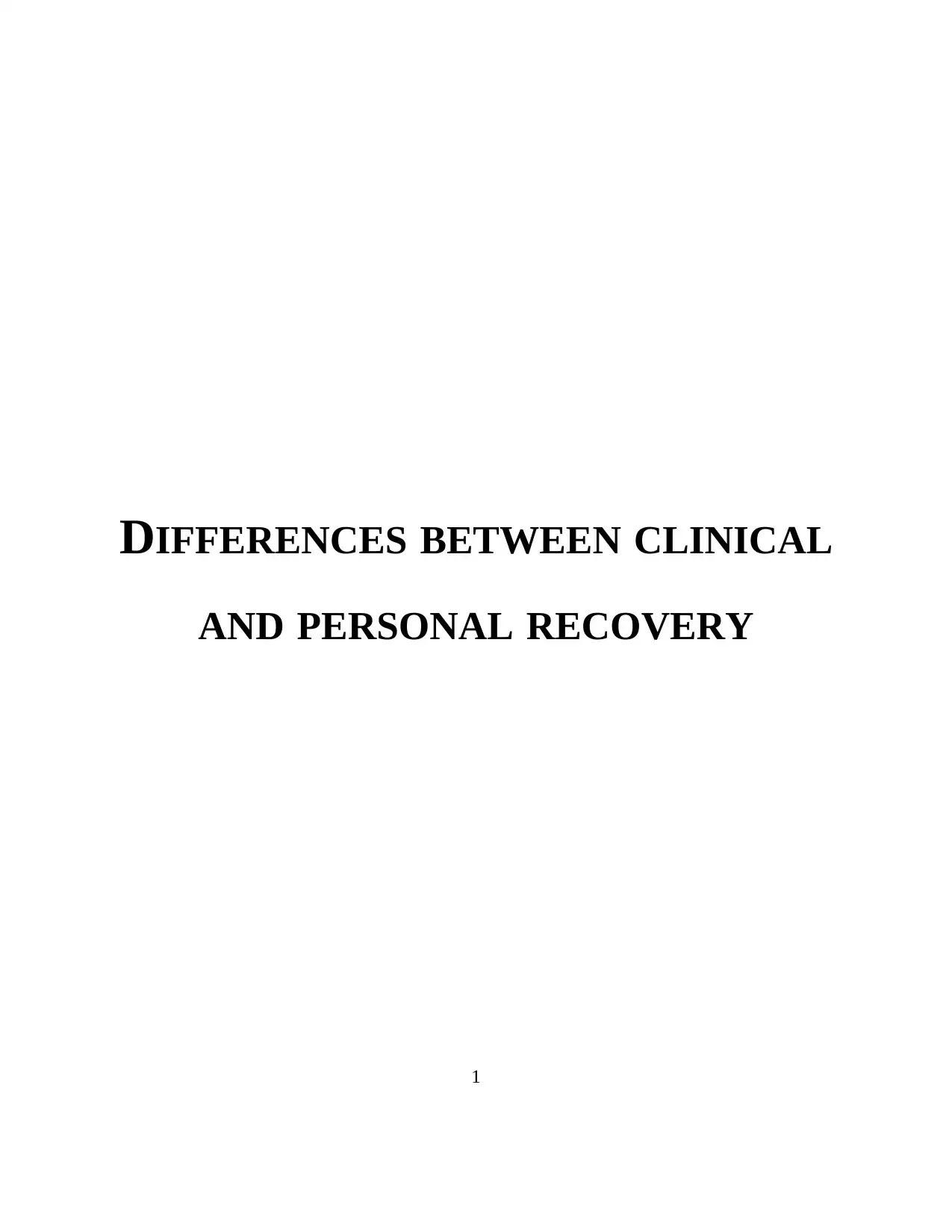
DIFFERENCES BETWEEN CLINICAL
AND PERSONAL RECOVERY
1
AND PERSONAL RECOVERY
1
Paraphrase This Document
Need a fresh take? Get an instant paraphrase of this document with our AI Paraphraser
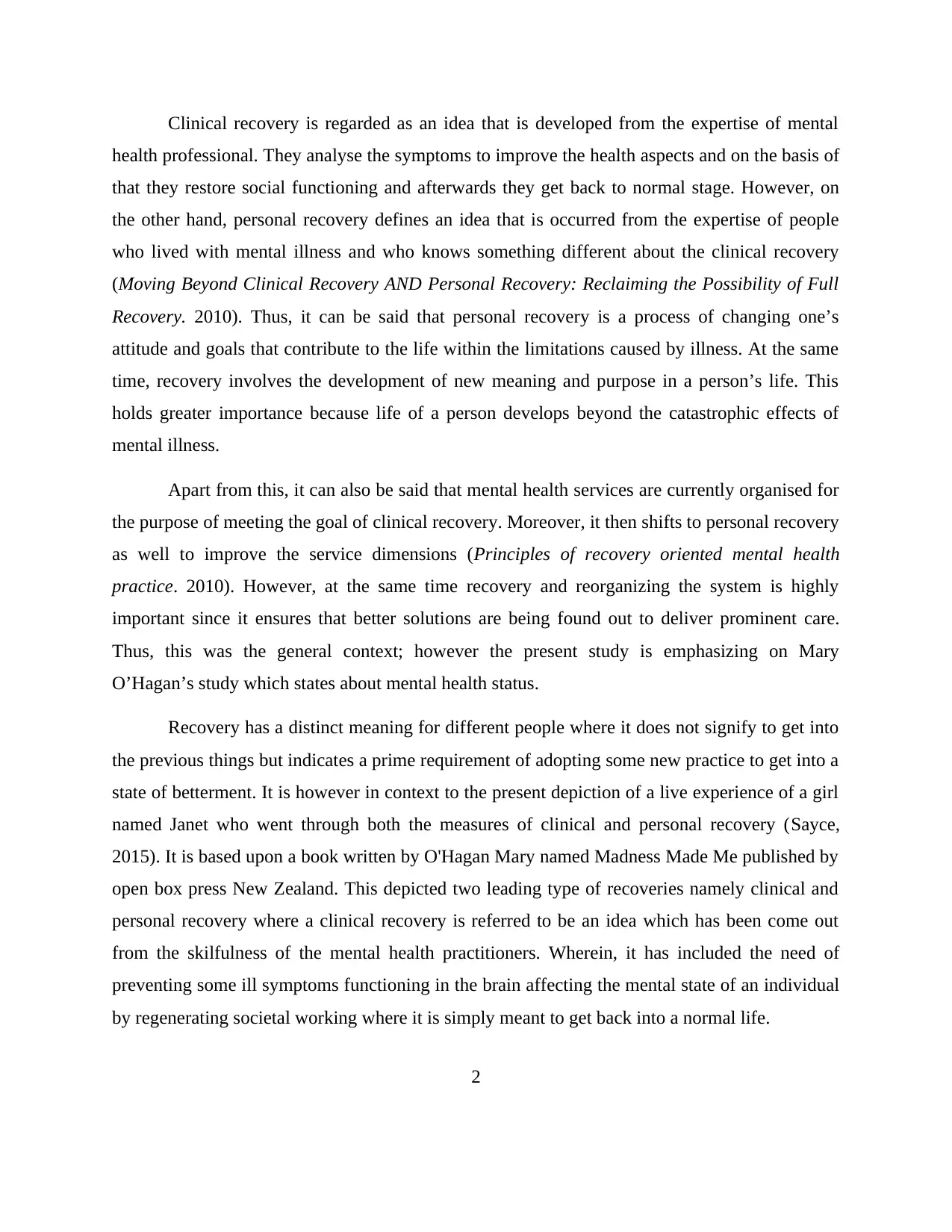
Clinical recovery is regarded as an idea that is developed from the expertise of mental
health professional. They analyse the symptoms to improve the health aspects and on the basis of
that they restore social functioning and afterwards they get back to normal stage. However, on
the other hand, personal recovery defines an idea that is occurred from the expertise of people
who lived with mental illness and who knows something different about the clinical recovery
(Moving Beyond Clinical Recovery AND Personal Recovery: Reclaiming the Possibility of Full
Recovery. 2010). Thus, it can be said that personal recovery is a process of changing one’s
attitude and goals that contribute to the life within the limitations caused by illness. At the same
time, recovery involves the development of new meaning and purpose in a person’s life. This
holds greater importance because life of a person develops beyond the catastrophic effects of
mental illness.
Apart from this, it can also be said that mental health services are currently organised for
the purpose of meeting the goal of clinical recovery. Moreover, it then shifts to personal recovery
as well to improve the service dimensions (Principles of recovery oriented mental health
practice. 2010). However, at the same time recovery and reorganizing the system is highly
important since it ensures that better solutions are being found out to deliver prominent care.
Thus, this was the general context; however the present study is emphasizing on Mary
O’Hagan’s study which states about mental health status.
Recovery has a distinct meaning for different people where it does not signify to get into
the previous things but indicates a prime requirement of adopting some new practice to get into a
state of betterment. It is however in context to the present depiction of a live experience of a girl
named Janet who went through both the measures of clinical and personal recovery (Sayce,
2015). It is based upon a book written by O'Hagan Mary named Madness Made Me published by
open box press New Zealand. This depicted two leading type of recoveries namely clinical and
personal recovery where a clinical recovery is referred to be an idea which has been come out
from the skilfulness of the mental health practitioners. Wherein, it has included the need of
preventing some ill symptoms functioning in the brain affecting the mental state of an individual
by regenerating societal working where it is simply meant to get back into a normal life.
2
health professional. They analyse the symptoms to improve the health aspects and on the basis of
that they restore social functioning and afterwards they get back to normal stage. However, on
the other hand, personal recovery defines an idea that is occurred from the expertise of people
who lived with mental illness and who knows something different about the clinical recovery
(Moving Beyond Clinical Recovery AND Personal Recovery: Reclaiming the Possibility of Full
Recovery. 2010). Thus, it can be said that personal recovery is a process of changing one’s
attitude and goals that contribute to the life within the limitations caused by illness. At the same
time, recovery involves the development of new meaning and purpose in a person’s life. This
holds greater importance because life of a person develops beyond the catastrophic effects of
mental illness.
Apart from this, it can also be said that mental health services are currently organised for
the purpose of meeting the goal of clinical recovery. Moreover, it then shifts to personal recovery
as well to improve the service dimensions (Principles of recovery oriented mental health
practice. 2010). However, at the same time recovery and reorganizing the system is highly
important since it ensures that better solutions are being found out to deliver prominent care.
Thus, this was the general context; however the present study is emphasizing on Mary
O’Hagan’s study which states about mental health status.
Recovery has a distinct meaning for different people where it does not signify to get into
the previous things but indicates a prime requirement of adopting some new practice to get into a
state of betterment. It is however in context to the present depiction of a live experience of a girl
named Janet who went through both the measures of clinical and personal recovery (Sayce,
2015). It is based upon a book written by O'Hagan Mary named Madness Made Me published by
open box press New Zealand. This depicted two leading type of recoveries namely clinical and
personal recovery where a clinical recovery is referred to be an idea which has been come out
from the skilfulness of the mental health practitioners. Wherein, it has included the need of
preventing some ill symptoms functioning in the brain affecting the mental state of an individual
by regenerating societal working where it is simply meant to get back into a normal life.
2
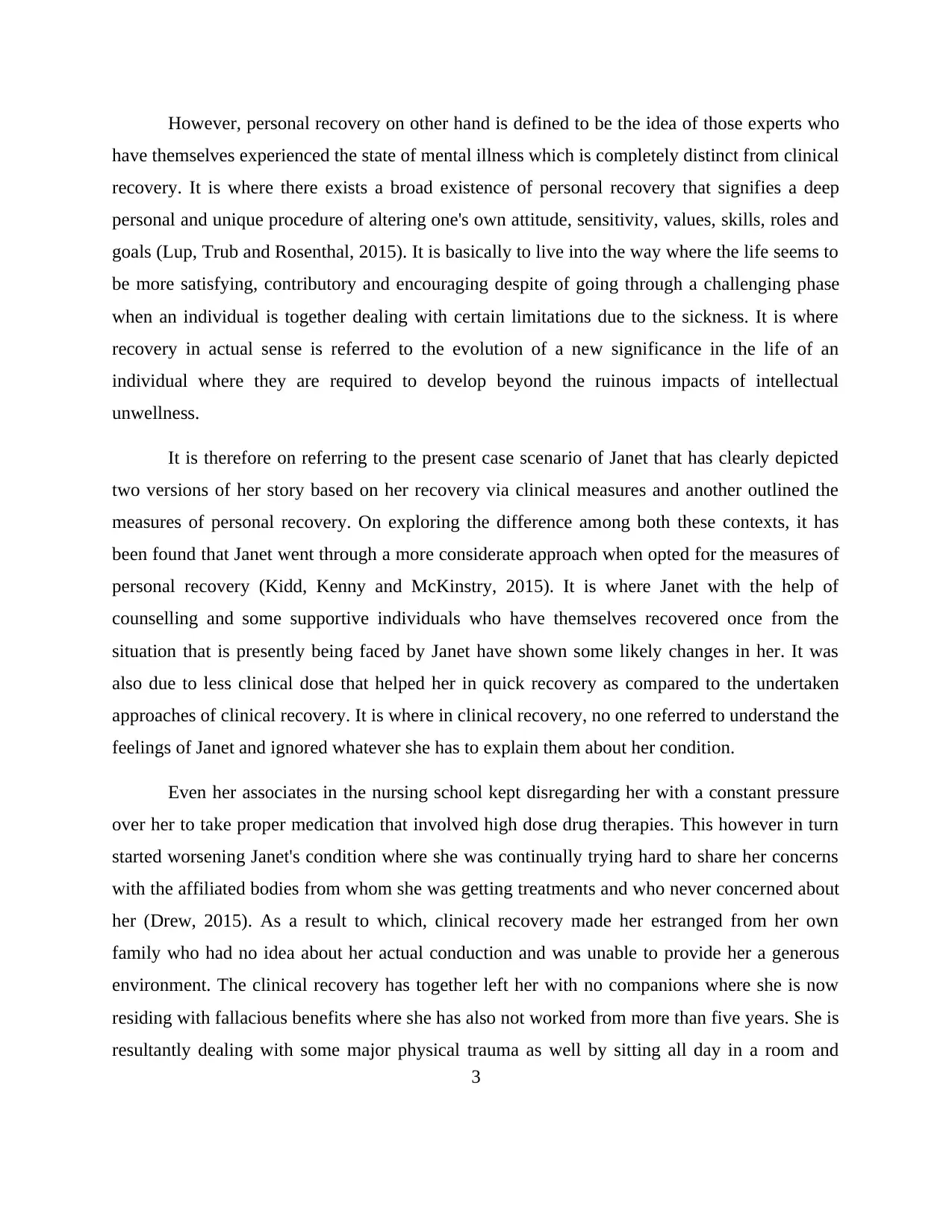
However, personal recovery on other hand is defined to be the idea of those experts who
have themselves experienced the state of mental illness which is completely distinct from clinical
recovery. It is where there exists a broad existence of personal recovery that signifies a deep
personal and unique procedure of altering one's own attitude, sensitivity, values, skills, roles and
goals (Lup, Trub and Rosenthal, 2015). It is basically to live into the way where the life seems to
be more satisfying, contributory and encouraging despite of going through a challenging phase
when an individual is together dealing with certain limitations due to the sickness. It is where
recovery in actual sense is referred to the evolution of a new significance in the life of an
individual where they are required to develop beyond the ruinous impacts of intellectual
unwellness.
It is therefore on referring to the present case scenario of Janet that has clearly depicted
two versions of her story based on her recovery via clinical measures and another outlined the
measures of personal recovery. On exploring the difference among both these contexts, it has
been found that Janet went through a more considerate approach when opted for the measures of
personal recovery (Kidd, Kenny and McKinstry, 2015). It is where Janet with the help of
counselling and some supportive individuals who have themselves recovered once from the
situation that is presently being faced by Janet have shown some likely changes in her. It was
also due to less clinical dose that helped her in quick recovery as compared to the undertaken
approaches of clinical recovery. It is where in clinical recovery, no one referred to understand the
feelings of Janet and ignored whatever she has to explain them about her condition.
Even her associates in the nursing school kept disregarding her with a constant pressure
over her to take proper medication that involved high dose drug therapies. This however in turn
started worsening Janet's condition where she was continually trying hard to share her concerns
with the affiliated bodies from whom she was getting treatments and who never concerned about
her (Drew, 2015). As a result to which, clinical recovery made her estranged from her own
family who had no idea about her actual conduction and was unable to provide her a generous
environment. The clinical recovery has together left her with no companions where she is now
residing with fallacious benefits where she has also not worked from more than five years. She is
resultantly dealing with some major physical trauma as well by sitting all day in a room and
3
have themselves experienced the state of mental illness which is completely distinct from clinical
recovery. It is where there exists a broad existence of personal recovery that signifies a deep
personal and unique procedure of altering one's own attitude, sensitivity, values, skills, roles and
goals (Lup, Trub and Rosenthal, 2015). It is basically to live into the way where the life seems to
be more satisfying, contributory and encouraging despite of going through a challenging phase
when an individual is together dealing with certain limitations due to the sickness. It is where
recovery in actual sense is referred to the evolution of a new significance in the life of an
individual where they are required to develop beyond the ruinous impacts of intellectual
unwellness.
It is therefore on referring to the present case scenario of Janet that has clearly depicted
two versions of her story based on her recovery via clinical measures and another outlined the
measures of personal recovery. On exploring the difference among both these contexts, it has
been found that Janet went through a more considerate approach when opted for the measures of
personal recovery (Kidd, Kenny and McKinstry, 2015). It is where Janet with the help of
counselling and some supportive individuals who have themselves recovered once from the
situation that is presently being faced by Janet have shown some likely changes in her. It was
also due to less clinical dose that helped her in quick recovery as compared to the undertaken
approaches of clinical recovery. It is where in clinical recovery, no one referred to understand the
feelings of Janet and ignored whatever she has to explain them about her condition.
Even her associates in the nursing school kept disregarding her with a constant pressure
over her to take proper medication that involved high dose drug therapies. This however in turn
started worsening Janet's condition where she was continually trying hard to share her concerns
with the affiliated bodies from whom she was getting treatments and who never concerned about
her (Drew, 2015). As a result to which, clinical recovery made her estranged from her own
family who had no idea about her actual conduction and was unable to provide her a generous
environment. The clinical recovery has together left her with no companions where she is now
residing with fallacious benefits where she has also not worked from more than five years. She is
resultantly dealing with some major physical trauma as well by sitting all day in a room and
3
⊘ This is a preview!⊘
Do you want full access?
Subscribe today to unlock all pages.

Trusted by 1+ million students worldwide
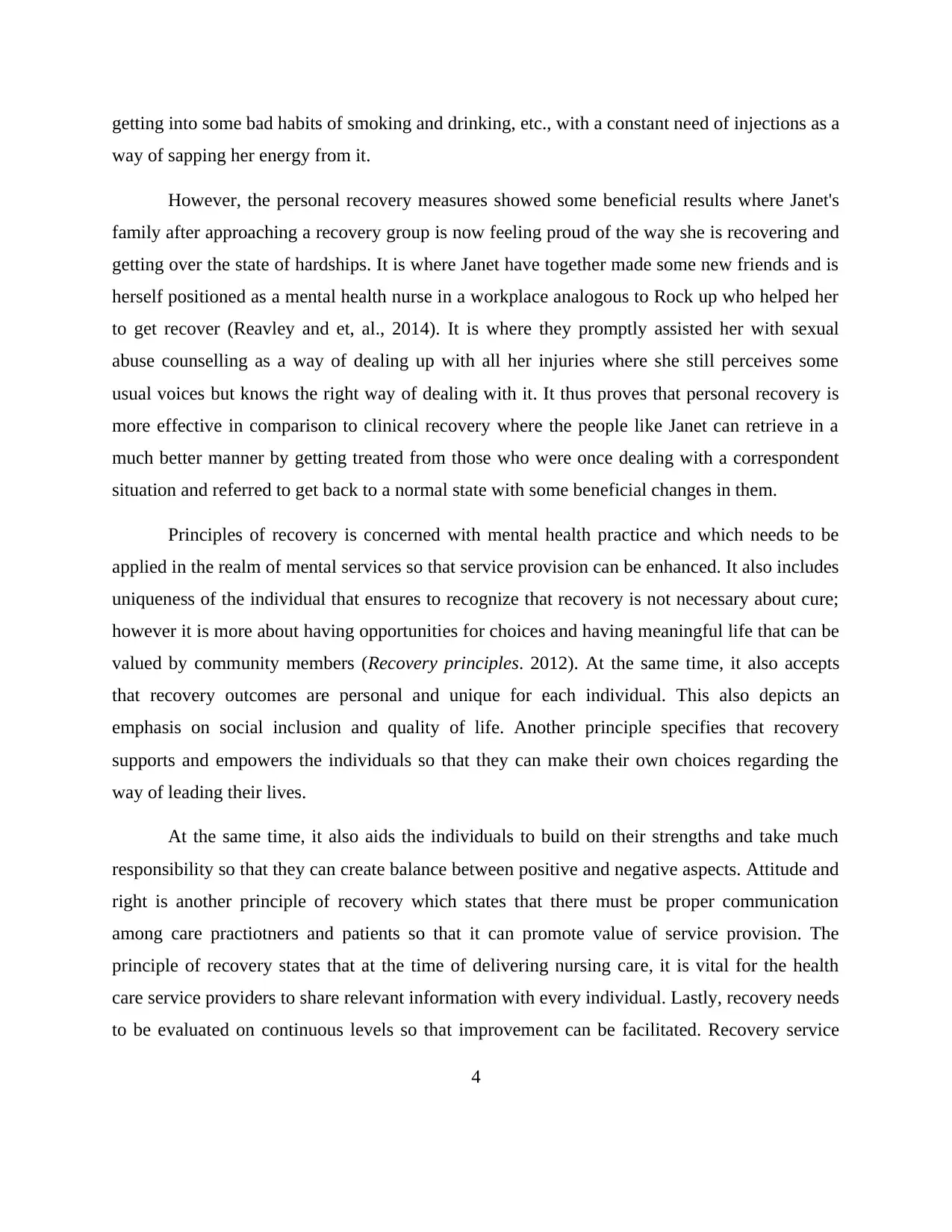
getting into some bad habits of smoking and drinking, etc., with a constant need of injections as a
way of sapping her energy from it.
However, the personal recovery measures showed some beneficial results where Janet's
family after approaching a recovery group is now feeling proud of the way she is recovering and
getting over the state of hardships. It is where Janet have together made some new friends and is
herself positioned as a mental health nurse in a workplace analogous to Rock up who helped her
to get recover (Reavley and et, al., 2014). It is where they promptly assisted her with sexual
abuse counselling as a way of dealing up with all her injuries where she still perceives some
usual voices but knows the right way of dealing with it. It thus proves that personal recovery is
more effective in comparison to clinical recovery where the people like Janet can retrieve in a
much better manner by getting treated from those who were once dealing with a correspondent
situation and referred to get back to a normal state with some beneficial changes in them.
Principles of recovery is concerned with mental health practice and which needs to be
applied in the realm of mental services so that service provision can be enhanced. It also includes
uniqueness of the individual that ensures to recognize that recovery is not necessary about cure;
however it is more about having opportunities for choices and having meaningful life that can be
valued by community members (Recovery principles. 2012). At the same time, it also accepts
that recovery outcomes are personal and unique for each individual. This also depicts an
emphasis on social inclusion and quality of life. Another principle specifies that recovery
supports and empowers the individuals so that they can make their own choices regarding the
way of leading their lives.
At the same time, it also aids the individuals to build on their strengths and take much
responsibility so that they can create balance between positive and negative aspects. Attitude and
right is another principle of recovery which states that there must be proper communication
among care practiotners and patients so that it can promote value of service provision. The
principle of recovery states that at the time of delivering nursing care, it is vital for the health
care service providers to share relevant information with every individual. Lastly, recovery needs
to be evaluated on continuous levels so that improvement can be facilitated. Recovery service
4
way of sapping her energy from it.
However, the personal recovery measures showed some beneficial results where Janet's
family after approaching a recovery group is now feeling proud of the way she is recovering and
getting over the state of hardships. It is where Janet have together made some new friends and is
herself positioned as a mental health nurse in a workplace analogous to Rock up who helped her
to get recover (Reavley and et, al., 2014). It is where they promptly assisted her with sexual
abuse counselling as a way of dealing up with all her injuries where she still perceives some
usual voices but knows the right way of dealing with it. It thus proves that personal recovery is
more effective in comparison to clinical recovery where the people like Janet can retrieve in a
much better manner by getting treated from those who were once dealing with a correspondent
situation and referred to get back to a normal state with some beneficial changes in them.
Principles of recovery is concerned with mental health practice and which needs to be
applied in the realm of mental services so that service provision can be enhanced. It also includes
uniqueness of the individual that ensures to recognize that recovery is not necessary about cure;
however it is more about having opportunities for choices and having meaningful life that can be
valued by community members (Recovery principles. 2012). At the same time, it also accepts
that recovery outcomes are personal and unique for each individual. This also depicts an
emphasis on social inclusion and quality of life. Another principle specifies that recovery
supports and empowers the individuals so that they can make their own choices regarding the
way of leading their lives.
At the same time, it also aids the individuals to build on their strengths and take much
responsibility so that they can create balance between positive and negative aspects. Attitude and
right is another principle of recovery which states that there must be proper communication
among care practiotners and patients so that it can promote value of service provision. The
principle of recovery states that at the time of delivering nursing care, it is vital for the health
care service providers to share relevant information with every individual. Lastly, recovery needs
to be evaluated on continuous levels so that improvement can be facilitated. Recovery service
4
Paraphrase This Document
Need a fresh take? Get an instant paraphrase of this document with our AI Paraphraser
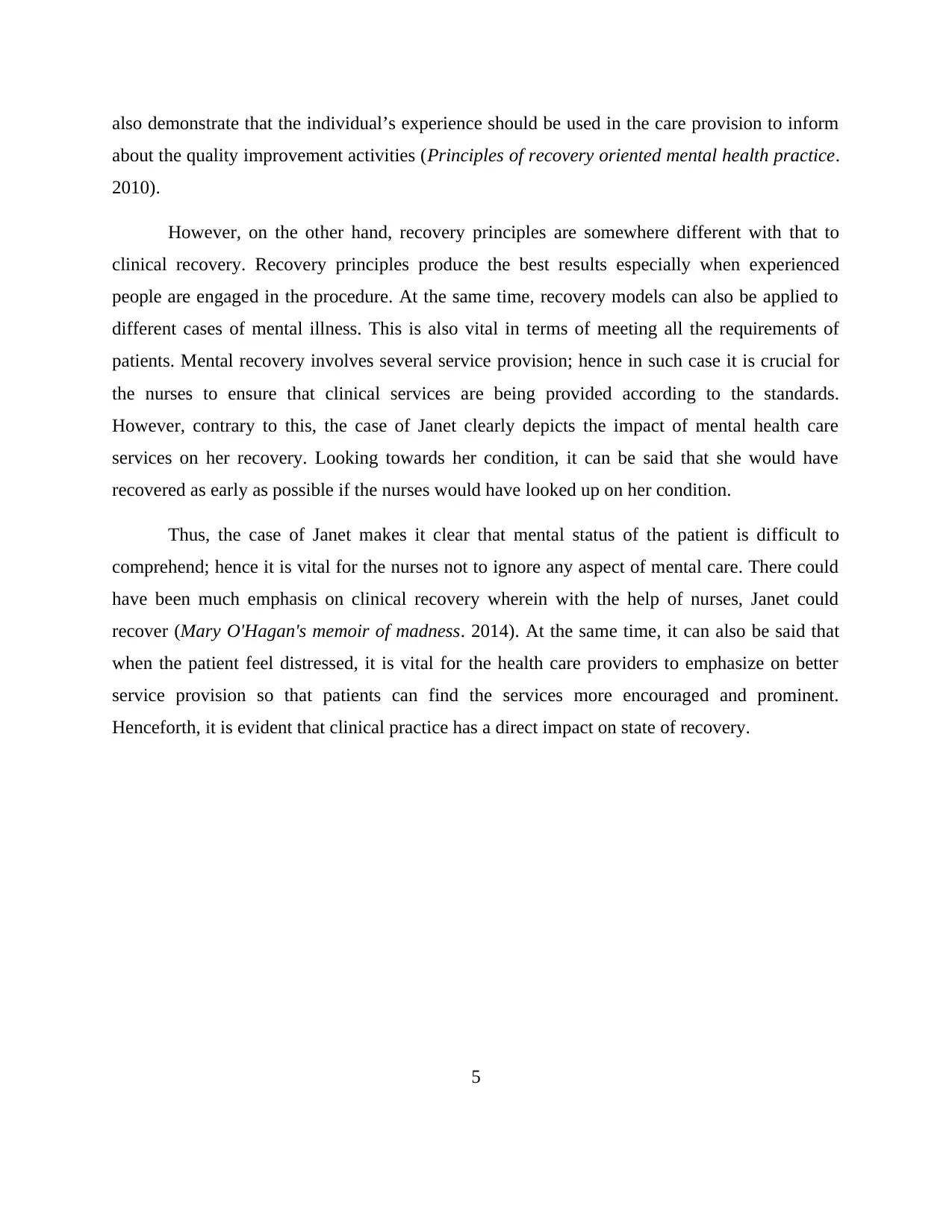
also demonstrate that the individual’s experience should be used in the care provision to inform
about the quality improvement activities (Principles of recovery oriented mental health practice.
2010).
However, on the other hand, recovery principles are somewhere different with that to
clinical recovery. Recovery principles produce the best results especially when experienced
people are engaged in the procedure. At the same time, recovery models can also be applied to
different cases of mental illness. This is also vital in terms of meeting all the requirements of
patients. Mental recovery involves several service provision; hence in such case it is crucial for
the nurses to ensure that clinical services are being provided according to the standards.
However, contrary to this, the case of Janet clearly depicts the impact of mental health care
services on her recovery. Looking towards her condition, it can be said that she would have
recovered as early as possible if the nurses would have looked up on her condition.
Thus, the case of Janet makes it clear that mental status of the patient is difficult to
comprehend; hence it is vital for the nurses not to ignore any aspect of mental care. There could
have been much emphasis on clinical recovery wherein with the help of nurses, Janet could
recover (Mary O'Hagan's memoir of madness. 2014). At the same time, it can also be said that
when the patient feel distressed, it is vital for the health care providers to emphasize on better
service provision so that patients can find the services more encouraged and prominent.
Henceforth, it is evident that clinical practice has a direct impact on state of recovery.
5
about the quality improvement activities (Principles of recovery oriented mental health practice.
2010).
However, on the other hand, recovery principles are somewhere different with that to
clinical recovery. Recovery principles produce the best results especially when experienced
people are engaged in the procedure. At the same time, recovery models can also be applied to
different cases of mental illness. This is also vital in terms of meeting all the requirements of
patients. Mental recovery involves several service provision; hence in such case it is crucial for
the nurses to ensure that clinical services are being provided according to the standards.
However, contrary to this, the case of Janet clearly depicts the impact of mental health care
services on her recovery. Looking towards her condition, it can be said that she would have
recovered as early as possible if the nurses would have looked up on her condition.
Thus, the case of Janet makes it clear that mental status of the patient is difficult to
comprehend; hence it is vital for the nurses not to ignore any aspect of mental care. There could
have been much emphasis on clinical recovery wherein with the help of nurses, Janet could
recover (Mary O'Hagan's memoir of madness. 2014). At the same time, it can also be said that
when the patient feel distressed, it is vital for the health care providers to emphasize on better
service provision so that patients can find the services more encouraged and prominent.
Henceforth, it is evident that clinical practice has a direct impact on state of recovery.
5
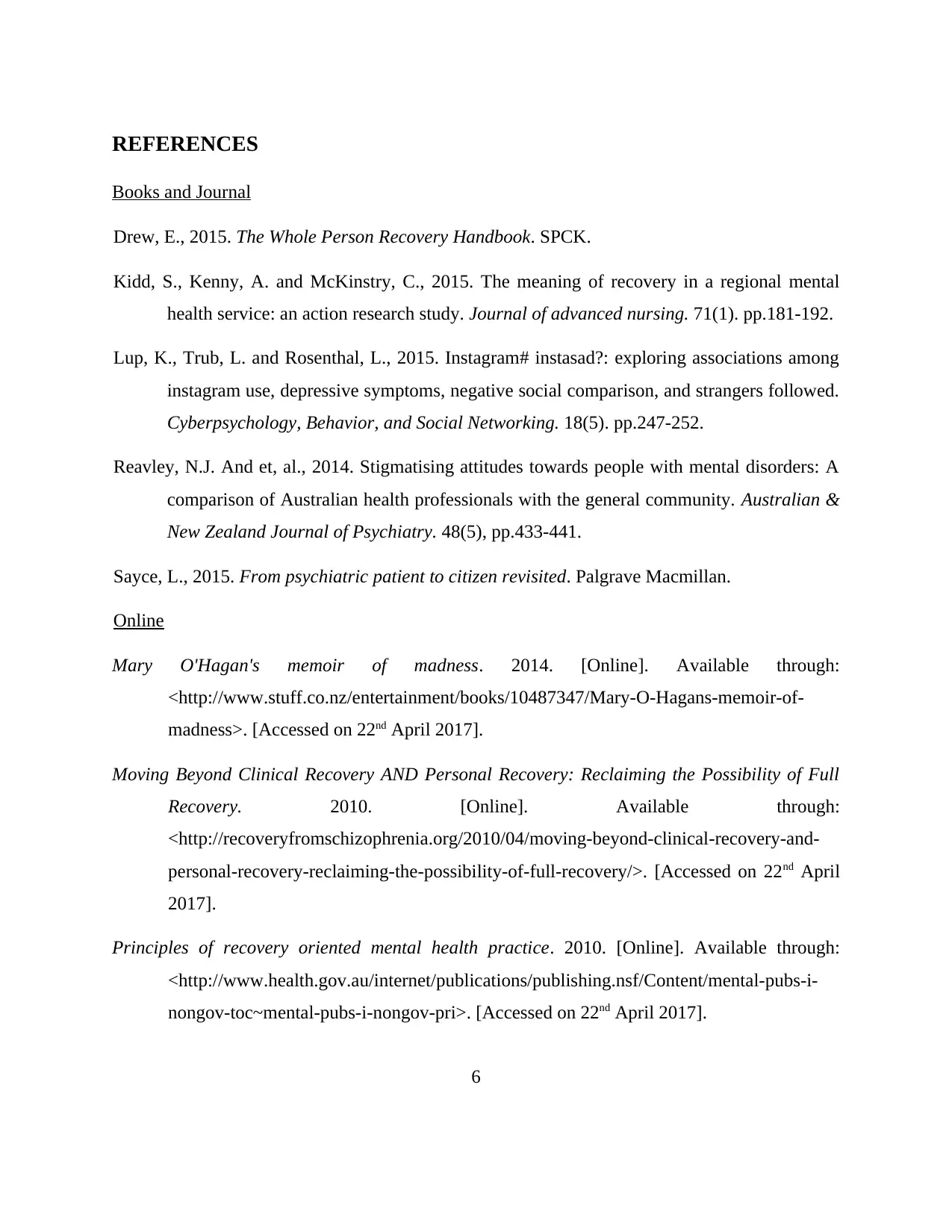
REFERENCES
Books and Journal
Drew, E., 2015. The Whole Person Recovery Handbook. SPCK.
Kidd, S., Kenny, A. and McKinstry, C., 2015. The meaning of recovery in a regional mental
health service: an action research study. Journal of advanced nursing. 71(1). pp.181-192.
Lup, K., Trub, L. and Rosenthal, L., 2015. Instagram# instasad?: exploring associations among
instagram use, depressive symptoms, negative social comparison, and strangers followed.
Cyberpsychology, Behavior, and Social Networking. 18(5). pp.247-252.
Reavley, N.J. And et, al., 2014. Stigmatising attitudes towards people with mental disorders: A
comparison of Australian health professionals with the general community. Australian &
New Zealand Journal of Psychiatry. 48(5), pp.433-441.
Sayce, L., 2015. From psychiatric patient to citizen revisited. Palgrave Macmillan.
Online
Mary O'Hagan's memoir of madness. 2014. [Online]. Available through:
<http://www.stuff.co.nz/entertainment/books/10487347/Mary-O-Hagans-memoir-of-
madness>. [Accessed on 22nd April 2017].
Moving Beyond Clinical Recovery AND Personal Recovery: Reclaiming the Possibility of Full
Recovery. 2010. [Online]. Available through:
<http://recoveryfromschizophrenia.org/2010/04/moving-beyond-clinical-recovery-and-
personal-recovery-reclaiming-the-possibility-of-full-recovery/>. [Accessed on 22nd April
2017].
Principles of recovery oriented mental health practice. 2010. [Online]. Available through:
<http://www.health.gov.au/internet/publications/publishing.nsf/Content/mental-pubs-i-
nongov-toc~mental-pubs-i-nongov-pri>. [Accessed on 22nd April 2017].
6
Books and Journal
Drew, E., 2015. The Whole Person Recovery Handbook. SPCK.
Kidd, S., Kenny, A. and McKinstry, C., 2015. The meaning of recovery in a regional mental
health service: an action research study. Journal of advanced nursing. 71(1). pp.181-192.
Lup, K., Trub, L. and Rosenthal, L., 2015. Instagram# instasad?: exploring associations among
instagram use, depressive symptoms, negative social comparison, and strangers followed.
Cyberpsychology, Behavior, and Social Networking. 18(5). pp.247-252.
Reavley, N.J. And et, al., 2014. Stigmatising attitudes towards people with mental disorders: A
comparison of Australian health professionals with the general community. Australian &
New Zealand Journal of Psychiatry. 48(5), pp.433-441.
Sayce, L., 2015. From psychiatric patient to citizen revisited. Palgrave Macmillan.
Online
Mary O'Hagan's memoir of madness. 2014. [Online]. Available through:
<http://www.stuff.co.nz/entertainment/books/10487347/Mary-O-Hagans-memoir-of-
madness>. [Accessed on 22nd April 2017].
Moving Beyond Clinical Recovery AND Personal Recovery: Reclaiming the Possibility of Full
Recovery. 2010. [Online]. Available through:
<http://recoveryfromschizophrenia.org/2010/04/moving-beyond-clinical-recovery-and-
personal-recovery-reclaiming-the-possibility-of-full-recovery/>. [Accessed on 22nd April
2017].
Principles of recovery oriented mental health practice. 2010. [Online]. Available through:
<http://www.health.gov.au/internet/publications/publishing.nsf/Content/mental-pubs-i-
nongov-toc~mental-pubs-i-nongov-pri>. [Accessed on 22nd April 2017].
6
⊘ This is a preview!⊘
Do you want full access?
Subscribe today to unlock all pages.

Trusted by 1+ million students worldwide

Recovery principles. 2012. [Online]. Available through:
<http://www.apa.org/monitor/2012/01/recovery-principles.aspx>. [Accessed on 22nd
April 2017].
7
<http://www.apa.org/monitor/2012/01/recovery-principles.aspx>. [Accessed on 22nd
April 2017].
7
1 out of 7
Related Documents
Your All-in-One AI-Powered Toolkit for Academic Success.
+13062052269
info@desklib.com
Available 24*7 on WhatsApp / Email
![[object Object]](/_next/static/media/star-bottom.7253800d.svg)
Unlock your academic potential
Copyright © 2020–2025 A2Z Services. All Rights Reserved. Developed and managed by ZUCOL.




